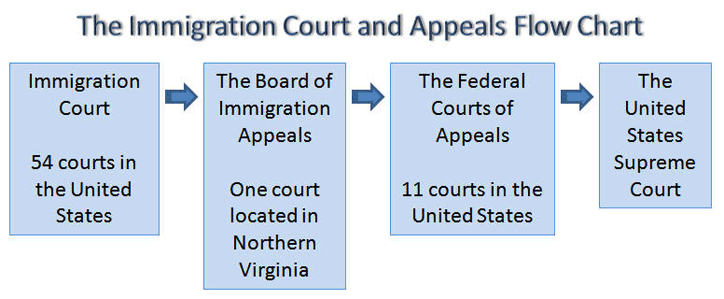Introduction
In the United States, there are currently over 60 immigration courts. The Department of Justice controls and manages these courts and you can view their website for more detailed information on each court.
If you are in removal/deportation proceedings, your case will be heard in one of these courts. Your best chance of beating deportation is in these courts. In many cases, the immigration judge has individual discretion to decide your case, as in waiver applications or cancellation of removal. In these cases, the immigration judge can consider at many factors – humanitarian issues, family issues, special needs, length of residency, good moral character, etc. – in making a decision about deportation. In other cases, the immigration judge is bound by law to decide your case, such as determining whether or not you are deportable based on criminal convictions. In these cases, the immigration judge has little or no discretion to decide your case because the immigration judge is bound by the current law to decide your case. In asylum cases, the immigration judge must follow the law on asylum, but the application is also a matter of discretion.
We fight hard on our client’s behalf, but we cannot control the decisions of the immigrations judges. If we feel the immigration judge made a mistake, we will generally recommend that our clients file an appeal to the Board of Immigration Appeals.
Appealing to the Board of Immigration Appeals (BIA)
The most import thing to remember is that even though you may have lost the battle in the immigration court, the war is not over. The immigration court is your best chance of beating deportation, but the Board of Immigration Appeals (BIA) is you next best chance. The BIA is a federal immigration appeals court and every appeal from every immigration court goes to the BIA. This is a critical stage because, in general, the BIA can completely review the decision of the immigration court. Remember, you only have 30 days to file a notice of appeal to the BIA. The firm has won many cases on appeal to the Board of Immigration Appeals.
In some cases, the Department of Homeland Security (DHS) will appeal your case even though you won. You need an experienced attorney to protect your hard-fought victory in the immigration court.
An appeal to the BIA is a critical stage because, in general, the BIA can completely review the decision of the immigration court. Our firm will file a notice of appeal, review your immigration court transcript, prepare a brief, and reply to any response brief filed by the DHS. If the BIA determines that your case was wrongly decided, the BIA will remand your case back to the immigration court so that the immigration court can correct its mistakes, which means that you will finally be able to beat deportation.
However, if the BIA determines that the immigration court did not make any mistakes, your fight against deportation is still not over because you now have the right to appeal your BIA decision to one of the 11 federal courts of appeals.
Federal appeals courts
The federal appeals courts are your last hope at beating deportation. The federal appeals courts review decisions by the BIA. Congress has restricted the jurisdiction of the federal appeals courts in recent years making it more difficult to prevail in these courts. Nevertheless, this option should not be overlooked.
The federal appeals court can only decide your case based on the record in the immigration court and the BIA. It is very important to submit critical information to the BIA through either a motion to reopen or a motion to reconsider concurrent with any appeal to the federal appeals courts. Our firm specializes in strategic motions practice in the BIA and well-written and well-researched briefs in the federal appeals courts to give you the best possible chance to beat deportation.
If the federal appeals courts reverses a decision of the BIA, your case will be sent back to the BIA for further review. Once the case has returned to the BIA, further briefing may be necessary or the BIA will simply remand the case back to the immigration court.

THE SUPREME COURT of the United States
If the federal appeals court denies your case, the last and absolute final step is to apply for certiorari to the Supreme Court of the United States. The Supreme Court of the United States does not take many cases, but it does take several immigration related cases each year. Even though it is a long shot, it is still a viable option, especially if there is a difference of opinions in the federal courts of appeals.



